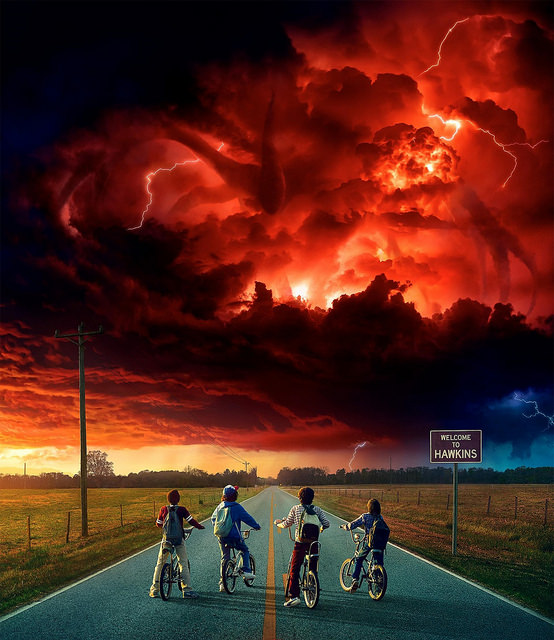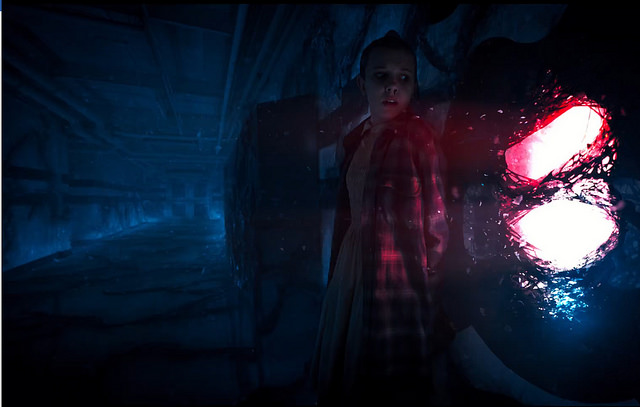I discovered a Netflix show called Stranger Things earlier this summer. Everybody else probably watched it when it dropped last fall. Either that, or you have no plans to watch it at all, so I am probably safe talking about it, but if you haven’t caught it and are planning to watch it, here are your Spoiler Warnings:
<SPoilEr WarnINg: Don’t read further if you still want to watch Stranger Things on your own>

Stranger Things is an eight-episode Netflix original that is a puzzling knot of 80’s nostalgia mixed with science fiction / spooky stuff. (Language Warning: the dialogue is salty) Imagine E.T. meets X-Files rolled out over eight one-hour episodes. It tells the story of the mysterious disappearance of a young boy named Will Byers and how the subsequent search for Will uncovers an increasingly mysterious world hidden in plain sight. It turns out Will is missing in “the upside-down,” a cold and dark dimension that seems to mirror our own.
Since last fall the show has won critical acclaim: a Screen Actors Guild Award for Outstanding Performance by an Ensemble in a Drama Series, and 18 Emmy Award nominations. It has spawned quite the cult following (complete with its own wiki) and it was announced just last week that Netflix has renewed the series for a second season which will be released on October 27th later this year. It is interesting for me because it combines popular media and some of the reading I’ve done for school over the past couple of years.
In his mammoth written work, A Secular Age, Charles Taylor (philosophy prof at McGill) explains that the Protestant church (and a few other factors) have helped create what he calls a “disenchanted age.” What he means is that today, most people automatically discount the supernatural. We only give full stock to what we can see and hear. There are no such things as ghosts or demon possession, or anything supernatural. Instead, we use science to explain the world and anything that science doesn’t explain doesn’t count.
Before western modernism prevailed, however, the world was an enchanted world. People were perfectly satisfied with supernatural explanations for things. The spirits lived in the forest, and the earth and sky had a tangible impact on our everyday world.
In order to function in this disenchanted world, we have created a “buffered self” to help us cope with the unexplained. All of this is hard for us to appreciate since we’ve been doing this since we were children (it’s like trying to explain “wet” to a fish) but it helps if you consider how you and I would respond to something unexplained, compared with someone who lived 500 years ago.
If you were, for some unexplained reason, feeling depressed or melancholy you would want to seek a doctor’s help, and with the use of medical tests, you would find the cause of your depression and then follow a treatment plan that would (hopefully) eliminate the symptoms you were experiencing. It helps here to know that the word “melancholy” comes from two Greek words “melas” which means black or dark, and “khole” which means bile. According to the ancient Greek physician Hippocrates, a person with too much black bile was melancholic.
But for a pre-modern person, learning that her mood comes from black bile doesn’t help because she does not think of herself in the abstract. Melancholy is not caused by black bile. Melancholy is black bile. Pre-modern people thought of themselves as integrated parts of the world they inhabit. They assumed that they were constantly influenced by their surroundings: the earth, the sky, the sea all played a part. Moderns on the other hand have “buffered selves” they think of themselves as separate from their surroundings.
So what?

Part of what makes a show like Stranger Things interesting is that it presents a porous picture of the world—a world where we are connected with each other and we are influenced by our surroundings—and people today find it compelling! The world of Stranger Things is a place where the boundaries between the natural world and the supernatural world are thin, and in some cases they are breaking down.

In the same way, the Celts of the middle ages talked about “thin places” places where the physical world and the spiritual world are close—the separation is thin. This kind of pre-modern way of seeing the world is finding more and more traction with post-modern people.
If you are a follower of Jesus it is more important than ever that you understand that the people in your life are willing to accept a spiritual world more than ever before, and this should have an impact in how you talk to people about your faith.
People who are not Christians, are not simply people who don’t believe in the supernatural. Current studies suggest that three-quarters of the general public have no difficulty believing in the Paranormal. Evangelism that seeks to convince people of the existence of the supernatural is barking up the wrong tree, so to speak.
The secular post-modern world is not crying out for more compelling evidence of the existence of God. We are in danger of answering questions that nobody is asking anymore. On the other hand, the secular world is desperately looking for a more compelling story and I think a show like Stranger Things is a guide to a different way of telling the gospel story.
What if the church was a community of people that were living a better story than the one that our materialistic, secular world is telling?
In Stranger Things, Will and his friends live in a flawed world. They are each part of families that are in some way dysfunctional. The twist (at least as far as the show is concerned) is that this world is not all there is. There is another world—the Upside Down—a timeless world that is breaking through. It is a dark and pitiless world that contains a monster that wants to seek and destroy life on the other side.
What if, rather than fighting the culture wars of transgender bathrooms and partisan politics, what if the church told a different story?
What if the church told a story (through our lives and values) that we live in a flawed world, but it wasn’t always like that. We live in a world that was created good but has become flawed and broken because of selfishness and sin. All of us are part of families that are in some way dysfunctional, but this world is not all there is. There is another world, a timeless world that is breaking through into this one. It is a beautiful world where there lives a God who loves us and who seeks to have a relationship with us. God came in the form of a human being named Jesus and we can know what this God is like by looking at what Jesus is like. Jesus is the King of an upside-down kingdom where those who mourn will one day be comforted, the hungry will one day be fed. The proud will be humbled and the humble will be exalted. The church is a beachhead of this coming kingdom and we are being invited to be a part of it!
Now that is a story that I would want to be a part of.
NCW